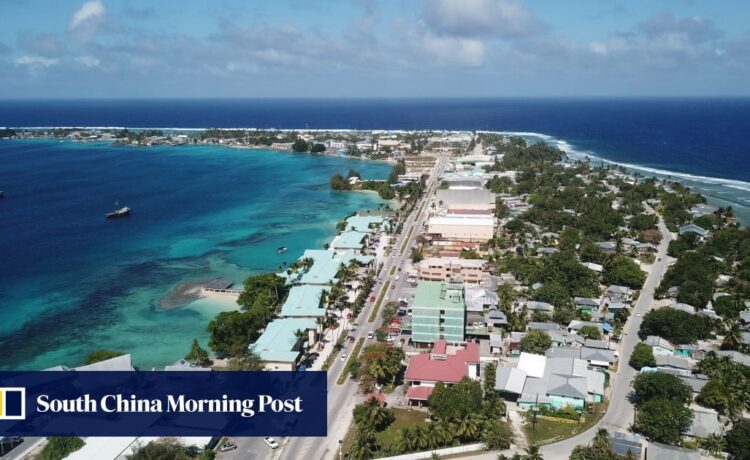An extension of the agreements, signed in the 1980s, needed to happen “this year, not next year”, Panuelo added, saying the deals “might well not exist if you wait any longer” as the countries “face financial cliffs”.

The former Micronesian president said if Congress did not approve the agreements by January 1 it would be “strikingly difficult” for children to attend school and mothers to find prenatal care in hospitals. He also said food insecurity would “skyrocket” and that importing food and fuel for power generation would become harder.
Taiwan, a self-ruled island, is considered a renegade province by China that is to be reunited with the mainland, by force if necessary.
The US, he added, was “already on the precipice of losing the North Pacific to Chinese influence and propaganda”.
Consensus no more? Democrats start to split from Republicans on China policy
Consensus no more? Democrats start to split from Republicans on China policy
For years Beijing and Washington have vied for influence in the Pacific islands, eager to advance their respective global commercial and defence ambitions.
The terse warning came days after Panuelo’s successor, Wesley Simina, suggested that if the US Congress did not approve Cofa funds “we will have to find different sources of funding … and that’s not out there available immediately”.
Asked by the Post about the letter, Jackson Soram, Micronesia’s ambassador to the US in Washington, stated on Tuesday he had “no comments”.
The Chinese embassy in Micronesia did not respond to a request for comment.
Robert Underwood of the Pacific Centre for Island Security, a Guam-based research institute, described Panuelo’s assessment as “a bit overblown”.
While agreeing that the freely associated states were facing economic turbulence, Underwood said “the justification and the attention given to the US-China competition and the effects of not funding these compacts I would say is overstated”.
Cofa was based on a long-term relationship and would be in place regardless of the two countries’ competing ambitions, he added, saying Panuelo was invoking “the China card” to push funding.
But Gordon Peake of the United States Institute of Peace, a non-partisan Washington- based body founded by Congress, disagreed with Underwood.
‘Nations can look elsewhere’: Micronesia ex-leader urges US to keep funds pledge
‘Nations can look elsewhere’: Micronesia ex-leader urges US to keep funds pledge
Peake described Panuelo as a “well-respected Pacific leader who has been long sounding the alarm bell about Chinese engagement in his country”.
Noting that funds for Micronesia and the Marshall Islands would run out on February 2 next year, Peake said Panuelo was using a “black-and-white and urgent tone” to get Congress’s attention instead of more “standard, reserved and diplomatic language”.
Echoing that sentiment, Cleo Paskal of the Foundation for Defence of Democracies, a Washington think tank, said she was “inclined to take [Panuelo] very seriously”.
As Micronesia’s president until May this year, Panuelo had “an information and intelligence service and a cybersecurity bureau at his disposal”, Paskal added.

Last week the White House called on Congress to pass Cofa-related legislation “as soon as possible”, according to a press release.
Extending such aid formed “a critical component” of the administration’s Indo-Pacific, Pacific partnership and national security strategies, it stated.
As of Tuesday, neither the White House nor Johnson’s press office had responded to requests for comments on Panuelo’s letter.
Biden earlier this year committed a total of US$7.1 billion over 20 years to the three nations – the largest-ever congressional budget request for the region.
Build now, pay later? Debt-ridden Fiji turns to China for port upgrades
Build now, pay later? Debt-ridden Fiji turns to China for port upgrades
The NDAA establishes the Pentagon’s top-line budget and directs its policy for the coming financial year. Full votes on the act are expected in both the US Senate and House chambers before the new year.
US secures Marshall Islands military deal, blunts China in vital Pacific region
US secures Marshall Islands military deal, blunts China in vital Pacific region
In a resolution on resetting economic ties with China adopted on Tuesday, the panel said the US should continue its commitments to the Cofa countries and expand its presence across the Pacific islands to counter China’s influence in the region.
The economies of the three island nations rely heavily on American subsidies, which for Micronesia account for roughly 40 per cent of its annual revenue.
For the Marshall Islands, US funding comprises about 70 per cent of its GDP.















